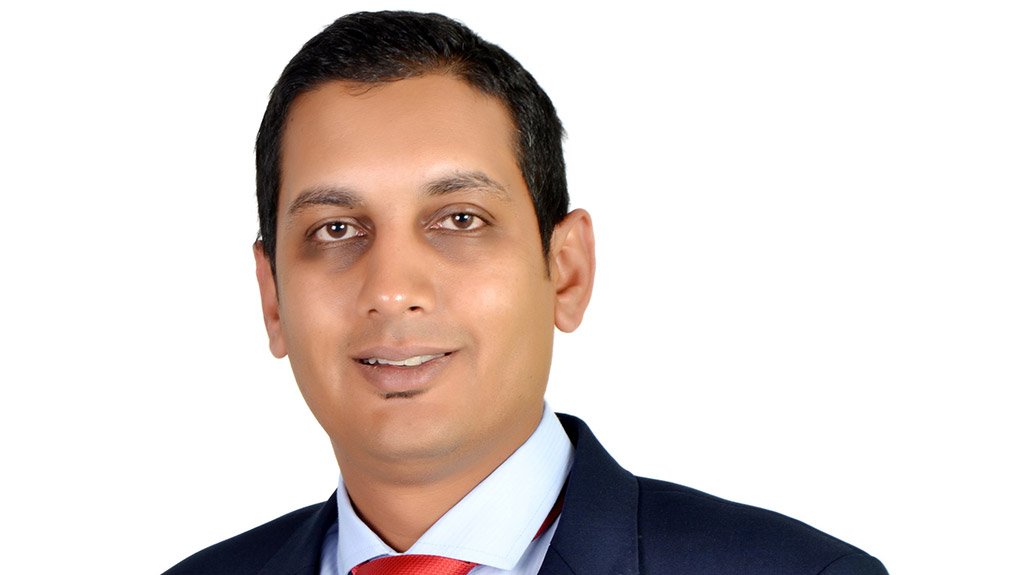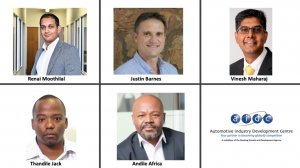Considerations, opportunities for South Africa’s entrenched automotive manufacturing industry


The Automotive Industry_ Building on South Africa’s success and facing the challenges of the future.
NAACAM executive director Renai Moothilal
South Africa’s automotive manufacturing sector has been a real success story for the country but there are several challenges and considerations that stakeholders must grapple with, as well as opportunities that can be capitalised on, as changes unfold, including a move towards electric vehicles.
This was noted by speakers during Creamer Media’s webinar, titled ‘The Automotive Industry: Building on South Africa’s success and facing the challenges of the future’, and held on July 26.
National Association of Automotive Component and Allied Manufacturers executive director Renai Moothilal attributed the success of the sector thus far to the country having a long-established history of automotive production and a very sophisticated network, both from an original equipment manufacturer perspective and the supplier base that had developed over a very long period of time.
Importantly, and supporting the strong private sector presence, there had been recognition and active involvement by various administrations of the South African government to provide serious levels of policy and incentive support, he pointed out.
Therefore, Moothilal said, the country had a fairly stable supporting mechanism.
He said this was an important point, with the need to recognise the role that various iterations of government policy have played in maintaining and growing different parts of the automotive value chain.
He also acclaimed that the country’s production base was considerably technologically diverse, with a strong multinational presence across the supplier base.
Moothilal also noted that the country had well-established industry structures, with good bodies and associations supporting automotive development, as well as robust engagement with organised labour environment.
He emphasised that, while there was always room for improvement, the sector had a strong base of infrastructure support, location advantages, dedicated maintenance of industrial policy and favourable export trade policies, which was why the sector had been a mainstay of the country’s manufacturing economy for some time.
Toyota Wessels Institute for Manufacturing Studies Manufacturing Ambassador Professor Justin Barnes posited that the South African automotive industry’s opportunity lay in Africa and in creating regional value chains.
He pointed out that an important area of focus for the country needed to be on increasing its domestic market, as this was tied to the number of vehicles it could export owing to rebates.
Barnes said there were only ten-million adults in the country that could afford to buy new cars and that figure was likely to remain flat given the challenging economic climate.
However, there were opportunities on the continent with several countries having growing middle classes. He suggested that South Africa should position itself as a hub for the region.
Barnes called for strategising an African automotive pact that would provide the biggest opportunity for growth in traditional vehicle production, but that would also support the potential production in relation to new energy vehicles (NEVs).
Coega Development Corporation senior business development manager Thandile Jack pointed out that there were lots of positive signs coming out of the market.
He reiterated Barnes’ point about Africa presenting a market of opportunity for South African vehicle manufacturers and added that the Middle East also presented a new market for the country, especially in terms of NEVs.
Jack emphasised that NEVs presented the greatest opportunity that the sector has had for a long time, and said the country must reshape and position itself to meet demand for both internal combustion engine vehicles and NEVs.
Automotive Industry Development Centre CEO Andile Africa pointed out that, as the country navigated the complex path towards NEVs, the industry must embrace transformation, which it had been slow to do.
He pointed out that there were financial resources available for this, but said this was not being properly used.
Article Enquiry
Email Article
Save Article
Feedback
To advertise email advertising@creamermedia.co.za or click here
Press Office
Announcements
What's On
Subscribe to improve your user experience...
Option 1 (equivalent of R125 a month):
Receive a weekly copy of Creamer Media's Engineering News & Mining Weekly magazine
(print copy for those in South Africa and e-magazine for those outside of South Africa)
Receive daily email newsletters
Access to full search results
Access archive of magazine back copies
Access to Projects in Progress
Access to ONE Research Report of your choice in PDF format
Option 2 (equivalent of R375 a month):
All benefits from Option 1
PLUS
Access to Creamer Media's Research Channel Africa for ALL Research Reports, in PDF format, on various industrial and mining sectors
including Electricity; Water; Energy Transition; Hydrogen; Roads, Rail and Ports; Coal; Gold; Platinum; Battery Metals; etc.
Already a subscriber?
Forgotten your password?
Receive weekly copy of Creamer Media's Engineering News & Mining Weekly magazine (print copy for those in South Africa and e-magazine for those outside of South Africa)
➕
Recieve daily email newsletters
➕
Access to full search results
➕
Access archive of magazine back copies
➕
Access to Projects in Progress
➕
Access to ONE Research Report of your choice in PDF format
RESEARCH CHANNEL AFRICA
R4500 (equivalent of R375 a month)
SUBSCRIBEAll benefits from Option 1
➕
Access to Creamer Media's Research Channel Africa for ALL Research Reports on various industrial and mining sectors, in PDF format, including on:
Electricity
➕
Water
➕
Energy Transition
➕
Hydrogen
➕
Roads, Rail and Ports
➕
Coal
➕
Gold
➕
Platinum
➕
Battery Metals
➕
etc.
Receive all benefits from Option 1 or Option 2 delivered to numerous people at your company
➕
Multiple User names and Passwords for simultaneous log-ins
➕
Intranet integration access to all in your organisation




















